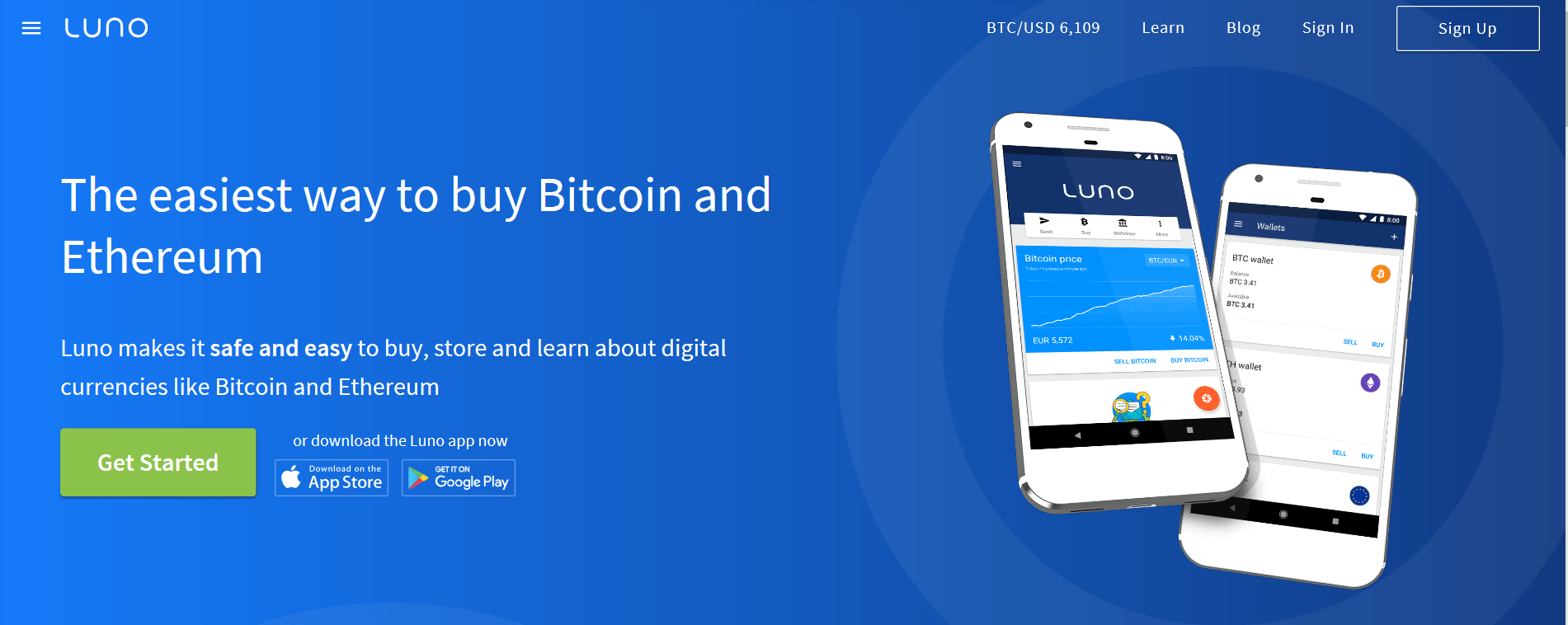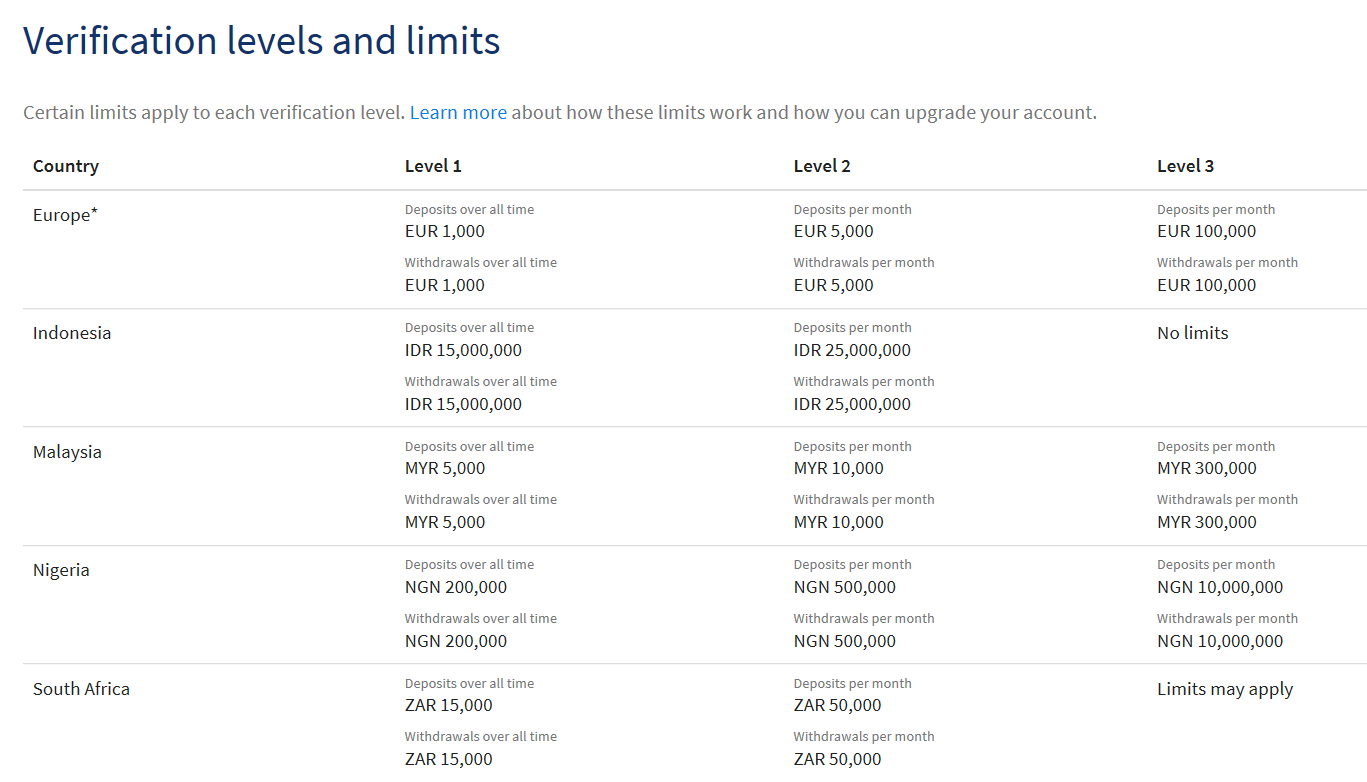Luno is a cryptocurrency exchange that has made a success of itself by focusing primarily on emerging markets. It’s still relatively small, but its strategy of entering developing countries has paid off and it continues to grow steadily, expanding beyond their African roots.
The most important question though, one that needs to be asked of every cryptocurrency exchange, is whether it is safe and trustworthy.
The review below will cover all the details you need about Luno, giving you the information you need to make an informed decision. Everything from security, to community reputation will be brought out, so let’s get going.
Luno Review: Overview
Luno began in 2013 as the exchange BitX in South Africa. Since that time it has obviously changed its name, and also moved its global headquarters to the current London location.
The Luno team has as their mission to help the billions of global citizens to buy, sell and store Bitcoin, Ether, and other cryptocurrencies. That team is a group of “40 technology and finance experts, operating across several countries and continents”.
The past year has seen rapid expansion thanks to backing from venture capitalists, and the company now has offices in London, Cape Town, and Singapore.
Based on the information available on the company website, the management team is quite open and transparent, which is a good sign when evaluating the trustworthy nature of a cryptocurrency exchange.
Luno Review: Security
Well, as far as I could find the exchange has never suffered a loss from a hacker, so that’s a positive. They also claim to store most funds in multisig cold storage wallets which are kept offsite and require the digital signatures of several Luno executives to access.
The funds that are kept in hot wallets are also multisig wallets shared by BitGo. With the keys split between two companies, Luno has added an additional layer of safety from hacking attempts.
As far as user side account safety is concerned, it is the basic email confirmations and two-factor authentication that has become standard at most cryptocurrency exchanges. Nothing special, but typically enough to keep user accounts secure.
Even though Luno seems secure, I still want to remind everyone that keeping large amounts of crypto in an exchange wallet is a bad idea. Transfer your crypto to your own wallet, where you control the keys.
Available Crypto Pairs
You’ll find a unique blend of crypto pairs available at Luno, primarily due to their user base, which isn’t the typical U.S., European or Chinese customers. Below are the pairs offered by Luno:
- BTC/IDR (Indonesian Rupiah)
- BTC/MYR (Malaysian Ringgit)
- BTC/NGN (Nigerian Naira)
- BTC/ZAR (South African Rand)
- ETH/BTC
The pairs offered at Luno clearly show its African origins, and the South African Rand remains the largest volume by far, followed by the Nigerian Naira. Luno has recently begun breaking into Southeast Asian markets, so the volumes in the Indonesian and Malaysian currency pairs are still small, but growing.
Luno has also begun expanding into the European markets, and while trading is not yet available in supported European countries, users can buy and sell Bitcoin and Ethereum using Euros. Still, the Euro order book remains quite small as Luno is not well known outside Africa.
Luno Review: Deposits/Withdrawals
Luno shares one similarity with its U.S. counterpart Coinbase, and that’s the ability of users to purchase Bitcoin and Ethereum using fiat currency by linking their bank account to the trading platform. Luno also accepts debit and credit cards as well as payments via Everypay and Upay.
Luno has put everything in place to make the whole process as simple and seamless as possible. Luno has one-upped Coinbase when it comes to deposits and withdrawals since withdrawals will hit your bank account within 48 hours (Coinbase can take a full week), and deposits take 24-48 hours to be credited (versus 3-5 business days with Coinbase).
For European customers wire transfers can be made via the SEPA system and typically take up to 48 hours. They are working to find a solution that will allow for instant bank payments for European customers. Withdrawals in Euros also use the SEPA system and also take up to 48 hours currently.
Luno Review: Fees
Luno keeps a fee schedule that is similar to many other cryptocurrency exchanges and has different percentages based on maker and taker orders. It’s also based on monthly trade volume, with users who have a higher volume of trades over the past 30 days getting better rates. Fees can go as high as 1% for takers, which is pretty high in the industry, but makers pay 0% fees and taker fees can go as low as 0.20%.
There is also a small withdrawal fee charged by Luno, which they refer to as an “admin fee”. It varies based on the country you’re in, and is 0.3 Euro in the European Union or R8.50 in South Africa for example. Deposits on the other hand are typically fee free. You can see a full listing of fees here.
Luno Review: Verification Process
Like most cryptocurrency exchanges you can sign up for an account with nothing more than an email address, but if you wan to withdraw or trade you need to go through additional verification procedures. These are based on Know Your Customer and Anti-Money Laundering regulations, and the requirements and limits vary depending on what country you live in. In each case there are four levels of verification though.
In order to access the full functionality of the platform you’ll need to get verified to the third level. At some exchanges you might expect this verification to take days, if not weeks. But Luno claims their verification is some of the fastest in the industry.
The verification process begins with verifying your mobile phone number and adding personal details to your account, such as a physical address. Then you need to upload identity documents to their system. Some examples of accepted identity documents include tax invoices, bank statements, and certain bills.
Once the documents have been uploaded it shouldn’t take more than 48 hours for your verification to be approved, and some users have reported it taking just 24 hours, or even less. It’s surprising to see how quickly they can onboard new clients when so many other cryptocurrency exchanges struggle with the process. Apparantly they’ve learned something from the mistakes of their competitors.
Luno Review: Regulatory Issues
In Southeast Asia Luno has been facing some regulatory issues. For examplem they have had their bank accounts in Malaysia frozen after tax authorities have asked for user information. It’s a familiar scenario that we’ve already seen between Coinbase and the IRS, and it’s likely to come up again and again in the coming years.
Luno says they are cooperating with Malaysian authorities, but have also refused to breach their client confidentiality. If this is true it’s a good sign of trust for traders.
Luno Review: VC Financing
Luno has recently had some success in raising capital from London based venture capital firms. September of 2017 saw Luno raising $9 million in series B financing from Balderton Capital. Obviously this cash injection has helped Luno’s expansion over the past 9 months. And in addition to the funds, the deal also saw Balderton Partner Tim Bunting join the board of Luno. This seems to provide them with a perfect launching pad for an expansion into the U.K. and Europe.
Luno Review: Customer Support
Luno gives customers two options for contact support.
If your problem is a basic one you can probably find an answer to it in the comprehensive help center provided by Luno. However, if you have a bigger issue, or one that is specific and unique to you it’s probably best to submit a help ticket for support.
Fortunately you can get fast responses from customer support as part of the $9 million in VC financing was used to dramatically increase the support staff at Luno. In fact, since last year the number of support personnel has jumped from 20 to more than 80. That’s a huge increase and it’s been noticable by the speed of verifications and answers to support tickets.
Luno’s Trading Platform
Of course the trading platform is one of the most important features of any platform, and Luno is no exception. You want a platform that is full featured, efficient and speedy. It should also be fairly intuitive so that the average user is able to easily navigate and find the actions they need.
Luno’s trading charts are definitely on the basic side, with little in the way of advanced features. The chart allows you to switch from a line chart to a bar chart, and you can also view market depth. The order book displays on the right of the screen. Other than that there is no charting functionality for technical analysis, and no in-depth analysis of the order book such as you’ll find on Poloniex and other large exchanges.
And on an aesthetic note, there is no way to change the charts to a “day version”, meaning you simply have to make do with the black background and dark colors of the chart. It’s not a huge deal for most, but some traders have expressed their frustration when trying to read these dark charts.
For South African traders the ZAR order book is fairly healthy, and the Nigerian order book is good as well. That may not be the case for Malaysian and Indonesian traders, who could find a lack of liquidity when trying to trade on Luno. Orders go through quickly however, and will show up on the order book nearly immediately.
It’s also nice to see that Luno has a mobile app for both iOS and Android, and that the Android version on the Google Play store has a 4.2 star rating with over 13k reviews. The mobile app contains the same functionality as the desktop version, and for those who don’t have a huge amount of Bitcoin it can also serve as a Bitcoin wallet of sorts, allowing you to send Bitcoin to those in your contacts list.
In Conclusion
For those in areas where Luno operates it’s a great little exchange. The exchange is highly targeted for residents of South Africa, Nigeria, Indonesia and Malaysia, and provides an excellent opportunity for trading in their native currencies.
Luno already seems to follow proper regulations and procedures when it comes to security, and has put systems in place to meet KYC and AML regulations. This will help them move into the European markets, but they will need to make improvements to the trading interface if they want to successfully compete with major exchanges.
They can also point to what might be one of the best customer service experiences in cryptocurrency exchanges. They certainly have good things going for them where they operate, making the big question for Luno to be whether they can expand on what they have and improve their weaker points.



